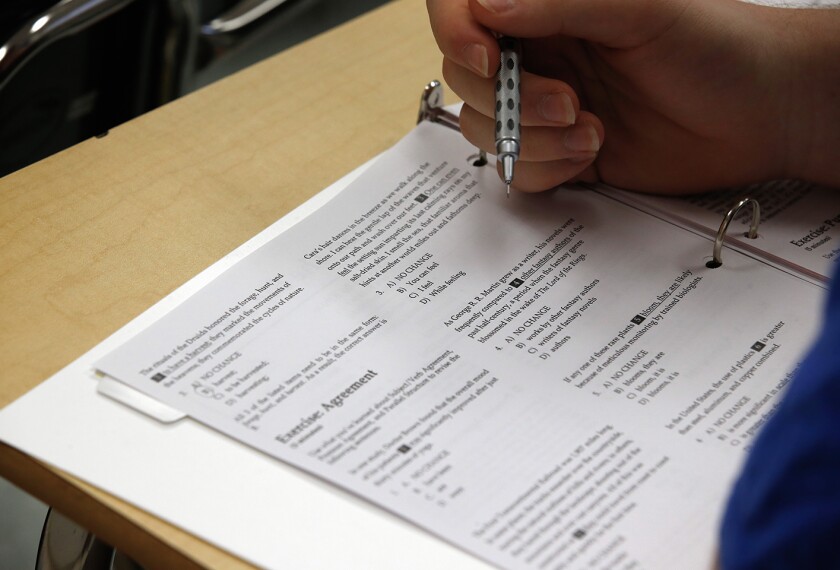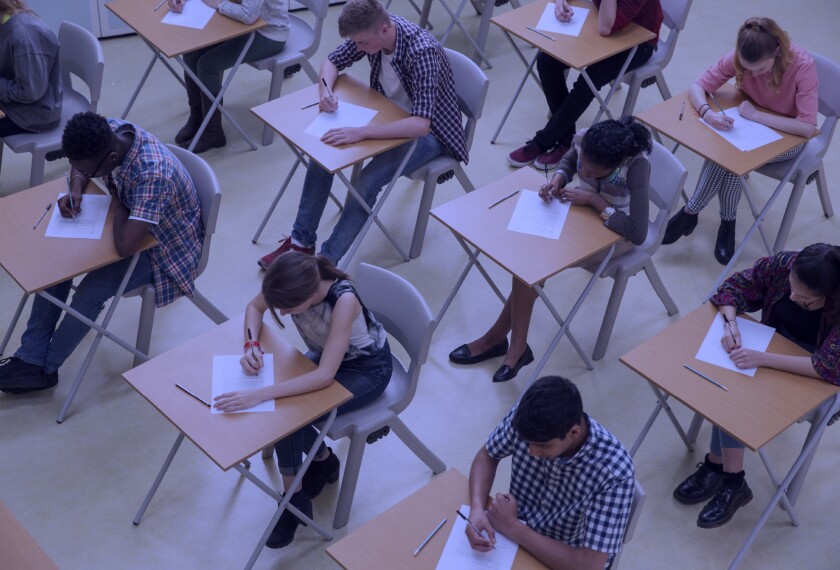More states could abandon high school exit exams as a graduation requirement for their students as general support for standardized tests cools.
Policymakers in Florida, New Jersey, and New York, three of the nine states that still require students to pass certain exams to graduate, have introduced measures to make the tests optional or do away with them completely. There’s also movement afoot in Massachusetts that could result in that state dumping its exit exam requirement.
Earlier this month, lawmakers in Florida introduced that would eliminate the requirement for students to pass its Algebra I end-of-course and 10th grade English/language arts exams to earn their diploma. The bill cleared the Senate’s education committee.
Also this month, lawmakers in New Jersey introduced that would prohibit the state board of education from requiring that students pass any standardized test to graduate. That bill has not yet made it through committee.
And in New York, the state’s Board of Regents is considering a panel’s recommendation to make the state’s long-running Regents exam, which tests proficiency in English, math, and science, optional.
In Massachusetts, voters could decide in the coming year whether to dump the decades-old requirement that 10th graders pass state math, English, and science exams to earn a high school diploma. The state’s largest teachers’ union is behind to collect enough signatures to place a question on the November 2024 ballot.
The number of states requiring exit exams has already fallen dramatically over the past decade.
In January, the National Center for Fair and Open Testing, or FairTest, an organization that tracks testing policies and has often criticized standardized tests, released an analysis showing that only eight states—Florida, Illinois, Louisiana, Massachusetts, New York, Texas, Virginia, and Wyoming—still require the exams. New Jersey rejoins that list this school year, as its exit exam requirement after a hiatus.
But those nine states are down from 13 in 2019 and from more than half of states in 2002, according to an Education Week review. The move away from exit exams has a lot to do with a growing sense that, while standardized tests measure student learning, they don’t capture the full range of student abilities, said John Papay, an associate professor of education at Brown University who studies high-stakes testing.
“There has been a mounting understanding that tests are useful, but limited,” Papay said. “That intersected with the pandemic, when a lot of states had to rethink these policies because students weren’t in schools to take these exams … It sort of became a moment where there was this renewed consideration about what was happening.”
The potential downsides of exit exams
Opponents of high school exit exams have criticized them for being an inaccurate measure of student learning; placing students of color, English learners, and students with disabilities at a disadvantage; and rewarding students for memorizing facts rather than demonstrating true mastery of academic concepts.
“On the one hand, there’s an understanding that having some objective metrics of student performance really helped to shine a light on some of the important inequities that existed in school systems,” Papay said. “On the other hand, for many reasons, including both in-school and out-of-school factors, students of color, students who grew up in poverty, multilingual learners, and students with disabilities tended to have lower scores on these exams.”
Depending on the state, whether or not a student passes an exam can have major consequences for their future. In on graduation rates, Papay and a team of researchers found that students who barely passed the exit exam in math were more likely to graduate than students who just barely missed the score to pass, even if the scores were only off by a fraction, meaning potentially drastically different outcomes for similar students.
Many of the exams, including those in Florida, Massachusetts, New Jersey, and New York, are given to students before 12th grade, and students often have multiple opportunities to pass. Opponents, however, argue that not doing well on those exams shouldn’t prevent a student from graduating, especially if they can demonstrate mastery in another way.
Equity was a concern for the blue ribbon commission that developed the recommendations for the New York exams that’s now before the Board of Regents.
The commission included a recommendation to provide students with a range of options, not just the Regents exams, to prove their proficiency and graduate. At a Nov. 13 board meeting, the commissioners specifically highlighted concerns about English learners and students with disabilities being at a disadvantage on the Regents exams.
“We acknowledge that Regents exams do play a part, but it is just one way of assessing students,” Angelique Johnson-Dingle, the New York education department’s deputy commissioner of P-12 instructional support, said during the meeting. “The commission felt strongly that we should look at other options that would be available to all students across the board.”
Concerns about the exams’ disproportionate impacts on certain groups of students are valid, Papay said, but it’s also important for policymakers to consider how the tests fit into opportunities to improve student learning.
“The important question is, what would the outcomes be if we didn’t have the exams?” Papay said. “Would more students be graduating? Would more students be building the knowledge and skills that we know they need to thrive if we didn’t have an exam? That’s a different question than, are students from different groups failing the exam at disproportionate rates?”








